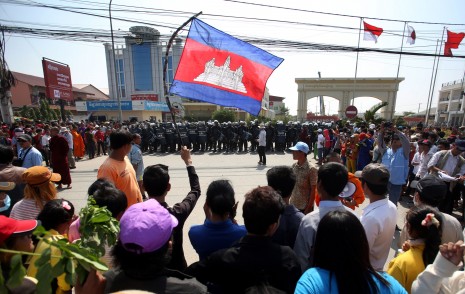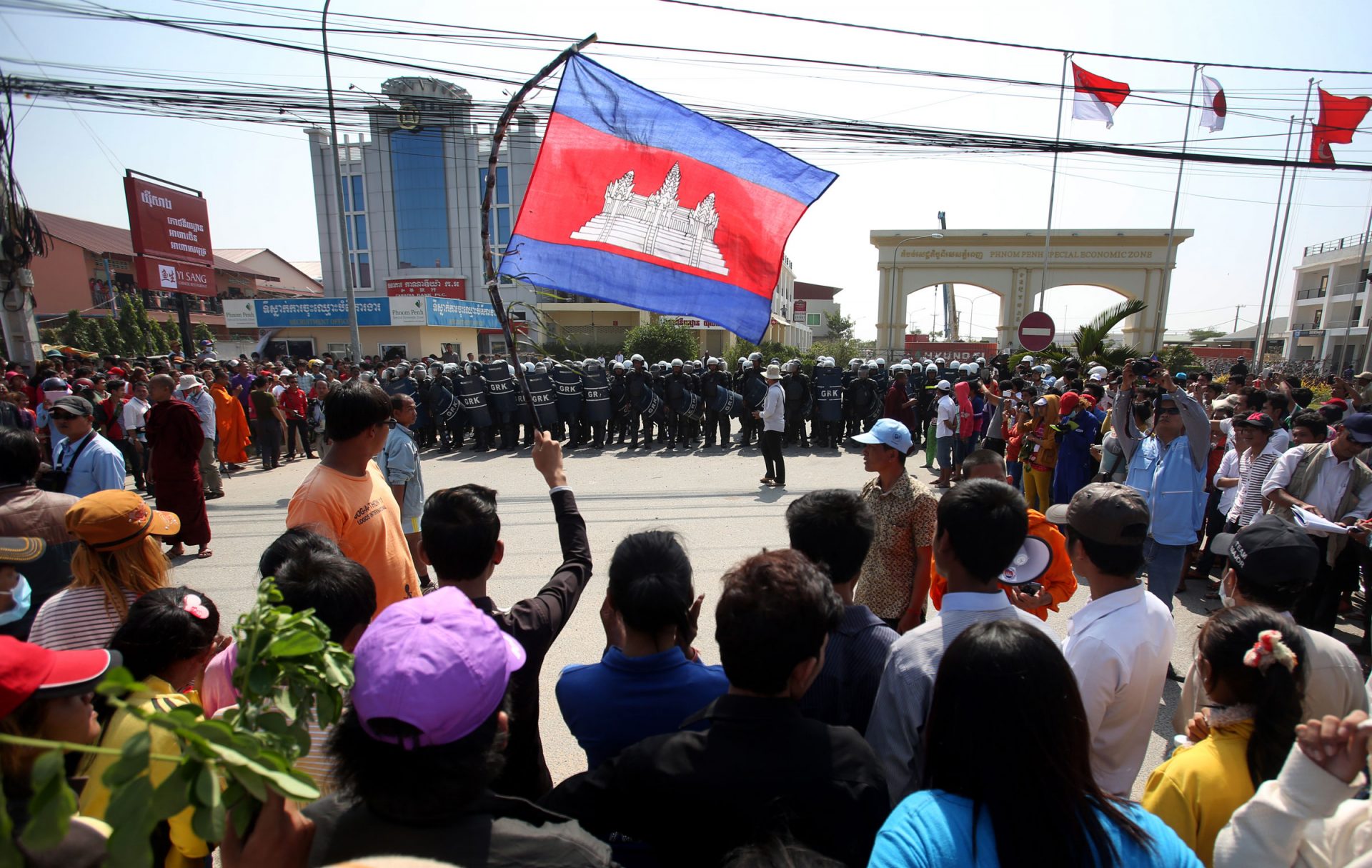Thousands of striking garment factory workers blocked two major thoroughfares in Phnom Penh on Friday, demanding that the government raise the minimum wage to $160, instead of the $95 figure that was decided upon earlier this week.
An official at the Garment Manufacturers Association in Cambodia (GMAC) said that the majority of more than 400 factories in the association remained closed on Friday in order to protect their workers and work sites from potentially violent elements in the demonstrations.

Beginning in the morning and continuing late into the afternoon, groups of striking workers demonstrated in front of the Ministry of Labor and Phnom Penh Special Economic Zone (SEZ), blocking traffic along Russian Boulevard and National Road 4.
More than 10,000 workers once again joined supporters of the opposition CNRP in Freedom Park for the 13th straight day of demonstrations calling for fresh elections and the removal of Prime Minister Hun Sen—and an increase of the minimum wage to $160.
Workers outside the SEZ briefly clashed with military police shortly before 9 a.m., resulting in injury to six workers, seven police officers and leading to the temporary detainment of three demonstrators.
According to protesters, military police attempted to stop workers inside the SEZ from walking off the job and joining striking workers who had arrived at their gates from another factory.
Demonstrators claimed that the military police began to beat some of the workers as they left the SEZ, at which point they began pelting the police with rocks, leading to more clashes.
At least three of the protesters were detained and held inside the SEZ gates—which were quickly reinforced with razor wire and a row of shipping containers stacked two high. The detained workers were later released. All three young men showed similar bruising around the right eye.
Chhong Phearun, 22, was among the detained. “First, military police told us to move away, then they used their baton to beat us and then we got angry and threw some rocks at the military police,” Mr. Phearun said, adding that police punched him in the face and beat his body during the clash.
Military police spokesman Kheng Tito said that workers had provoked the scuffle.
“We cracked down on the workers because some workers threw stones at the military police and attempted to damage Phnom Penh Special Economic Zone,” Brigadier General Tito said.
“Three of our military police officials injured [demonstrators’] heads because some of the workers threw stones at them.”
Brig. Gen. Tito said he could not verify reports that officers fired warning shots during the clashes.
Rath Srieng, commander of the Phnom Penh military police, said that only two demonstrators were detained, adding that seven military police were injured.
“We just detained two workers and educated them and we let them go home and I gave them 100,000 riel [about $25] each,” Major General Srieng said. “We did not beat them, but seven military police were injured.”
Oum Visal, a legal officer with the Cambodian Coalition of Apparel Workers Democratic Union (CCAWDU), one of the unions involved in the protest, decried the military police’s suppression of demonstrators.
“Three of the six workers who were injured were detained for many hours before being released. I think the military police’s actions, beating workers like this, is a serious abuse of human rights,” Mr. Visal said.
The eventual release of the three protesters did little to defuse the demonstration, which dragged on throughout the afternoon and blocked traffic trying to leave Phnom Penh, most of it commercial transport, which backed up for about half a kilometer around the SEZ.
Standing beneath a roadside billboard that read “A safe destination for your investment, Phnom Penh Special Economic Zone,” protesters mixed demands for higher wages with calls for Prime Minister Hun Sen to resign.
Across town, more than 2,000 protesting workers blocked Russian Boulevard and the entrance gates of the Ministry of Labor beginning at about 10 a.m., dispersing only after union leaders emerged from a two-and-a-half-hour meeting with ministry officials around 5:30 p.m.
Throughout the day, union leaders took turns standing atop tuk-tuks wired with loudspeakers leading chants calling for a $160 monthly wage for the more than 400,000 garment factory workers in the country.
“A salary of $95 is not enough for workers to pay their daily expenses, and the cost of food and rent is rising,” Yang Sophorn, president of the Cambodian Alliance of Trade Unions, proclaimed to rapturous cheers.
Workers, many sitting at the gates of the Labor Ministry, prevented staff from leaving the compound until demonstrators disbanded shortly after 5:30 p.m. The steady traffic of commuters and students coming from nearby universities and into the city from the direction of Phnom Penh International Airport was redirected onto Kampuchea Krom Boulevard.
Following the meeting at the Ministry of Labor, union leaders said that there was no breakthrough in revising the government’s plan to raise the minimum wage to $95 in April, but talks will continue on Monday.
Rong Chhun, president of the Cambodian Confederation of Unions, said following the meeting that “the result was zero.”
“We have asked the ministry to continue negotiating to get a result so workers can get back to work,” Mr. Chhun told the assembled demonstrators outside the ministry.
“We still have hope when the force of workers’ solidarity is more and more from day to day. We will be successful,” he said.
Heng Sour, spokesman for the Ministry of Labor, said that ministry officials spoke with union leaders about “illegal strikes” and roadblocks, which were threatening public order and infringing on other workers’ right to work.
He added that the government will encourage union leaders to meet with employers to reach a solution to the nationwide dispute.
“The ministry will urge members of GMAC to meet with unions to negotiate what wage they can possibly offer to workers,” he said.
Ken Loo, secretary-general of GMAC, said that only the government could bring an end to the unrest, and was evasive on the issue of giving workers more money.
“The government is the only organization, the only body that can resolve this problem,” Mr. Loo said.
“The problem we are referring to is, number one, the hooliganism, and, number two, the demonstrations.”
Members of GMAC’s executive committee on Thursday said that rogue groups not affiliated with their companies have destroyed property at their factories and intimidated their workers into joining demonstrations.
Ath Thorn, president of CCAWDU, the country’s largest independent union, said that union leaders would meet again with the Ministry of Labor on Monday, but pledged continued strikes until demands for a $160 minimum wage are met.
“Workers will continue to protest, but we haven’t decided whether to protest tomorrow at the Ministry of Labor or protest at the factories,” Mr. Thorn said.
Mr. Visal, the CCAWDU legal officer, said workers will continue demonstrations in front of the PPSEZ on Saturday.
(Khy Sovuthy, Khuon Narim, Zsombor Peter and Colin Meyn)




